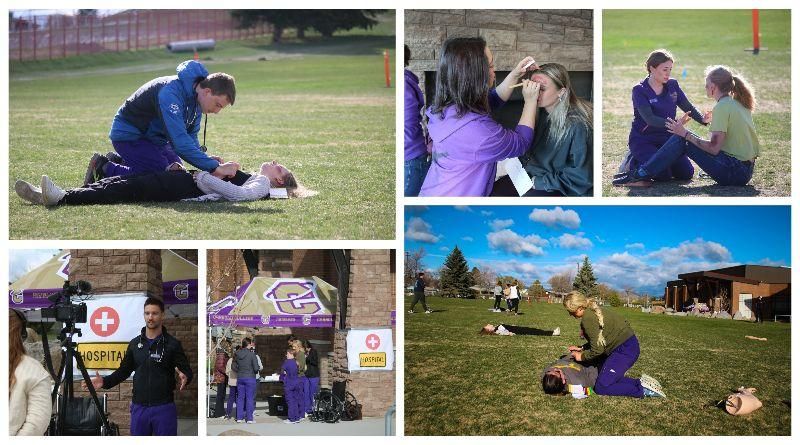On Tuesday, April 30, nursing students from both the traditional and accelerated tracks at Carroll College participated in a mock Mass Casualty Incident (MCI) as part of their clinical training. The scenario simulated an attack on the Montana Capitol building, focusing on disaster triaging, incident command, and trauma-informed care skills.
“The mock mass casualty event provided me with valuable opportunities to refine my assessing and triaging skills, which are essential. The hands-on experience gave me the chance to prioritize patient care effectively and make quick, informed decisions in a real time, high-pressure situation. I am grateful for opportunities like this, and I'm so appreciative of everyone who worked so hard to make this a possibility for the students.”
~ Grace McGreevey, senior, Helena, MT
The event was a collaborative effort involving the Carroll College Theatre Department, Master of Social Work faculty, and volunteers from healthcare, law enforcement, and county services. Over eighty individuals, including many theatre students and a number of Carroll alumni, contributed their time to ensure the training's success. Such simulations are crucial as they prepare students for real-life emergencies, allowing them to understand their roles in complex healthcare situations better.
You can view the KTVH coverage of the training event here: Carroll College nursing students train for mass casualty situation.
This is the second year of the MCI training. This extensive effort has been expertly coordinated by Assistant Professor of Nursing, Kate Pieper.
"Prior to coming to Carroll to teach nursing, my specialties were hospital administration and emergency medicine. A large part of both of these is being prepared for disasters which I have been actively involved in on multiple occasions. I wanted students to have the opportunity to learn and experience using the tools in a safe environment. The MCI simulation not only allows them to use skills they have obtained in earlier classes, but also to use the triage system set forth nationally as well as the Incident Command System. The last portion focuses on trauma informed care which is important for victims, but also healthcare workers. It allows them to process the trauma and remain in the industry. My hope is that students can fall back on the skills they practiced during the MCI when they encounter a true disaster."
~ Kate Pieper, BSN, Assistant Professor, Nursing
"The mass casualty incident that the nursing department seniors had the opportunity to attend was an eventful day with lots of great information on how mass casualties are handled by those who prepare for them. Personally, I learned a lot about myself and was very grateful for this opportunity. I think people need to keep in mind that this is a mock event done with very limited funding. Given that, it took great collaboration and the kindness of all those giving their time to pull off. It’s a great experience that brings the students closer together and if nothing else, provides memories for years to come. Thanks to professor Pieper and all those involved in planning and implementing this day."
~ Amber Rauser, ACNU, Helena, MT

